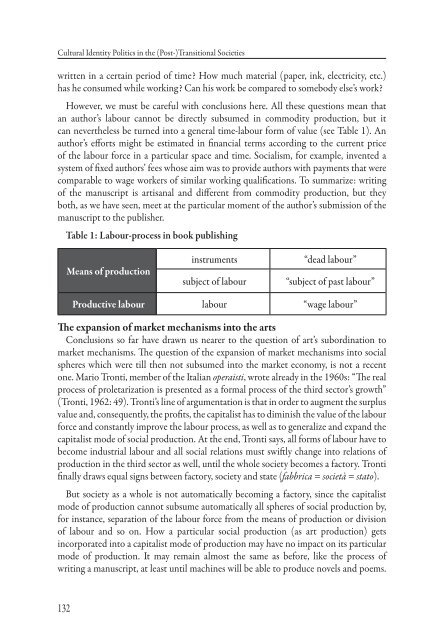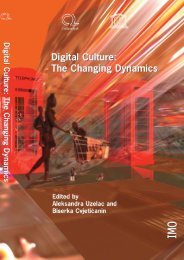free download in pdf format - Culturelink Network
free download in pdf format - Culturelink Network
free download in pdf format - Culturelink Network
You also want an ePaper? Increase the reach of your titles
YUMPU automatically turns print PDFs into web optimized ePapers that Google loves.
Cultural Identity Politics <strong>in</strong> the (Post-)Transitional Societies<br />
written <strong>in</strong> a certa<strong>in</strong> period of time? How much material (paper, <strong>in</strong>k, electricity, etc.)<br />
has he consumed while work<strong>in</strong>g? Can his work be compared to somebody else’s work?<br />
However, we must be careful with conclusions here. All these questions mean that<br />
an author’s labour cannot be directly subsumed <strong>in</strong> commodity production, but it<br />
can nevertheless be turned <strong>in</strong>to a general time-labour form of value (see Table 1). An<br />
author’s eff orts might be estimated <strong>in</strong> fi nancial terms accord<strong>in</strong>g to the current price<br />
of the labour force <strong>in</strong> a particular space and time. Socialism, for example, <strong>in</strong>vented a<br />
system of fi xed authors’ fees whose aim was to provide authors with payments that were<br />
comparable to wage workers of similar work<strong>in</strong>g qualifi cations. To summarize: writ<strong>in</strong>g<br />
of the manuscript is artisanal and diff erent from commodity production, but they<br />
both, as we have seen, meet at the particular moment of the author’s submission of the<br />
manuscript to the publisher.<br />
Table 1: Labour-process <strong>in</strong> book publish<strong>in</strong>g<br />
132<br />
Means of production<br />
<strong>in</strong>struments “dead labour”<br />
subject of labour “subject of past labour”<br />
Productive labour labour “wage labour”<br />
Th e expansion of market mechanisms <strong>in</strong>to the arts<br />
Conclusions so far have drawn us nearer to the question of art’s subord<strong>in</strong>ation to<br />
market mechanisms. Th e question of the expansion of market mechanisms <strong>in</strong>to social<br />
spheres which were till then not subsumed <strong>in</strong>to the market economy, is not a recent<br />
one. Mario Tronti, member of the Italian operaisti, wrote already <strong>in</strong> the 1960s: “Th e real<br />
process of proletarization is presented as a formal process of the third sector’s growth”<br />
(Tronti, 1962: 49). Tronti’s l<strong>in</strong>e of argumentation is that <strong>in</strong> order to augment the surplus<br />
value and, consequently, the profi ts, the capitalist has to dim<strong>in</strong>ish the value of the labour<br />
force and constantly improve the labour process, as well as to generalize and expand the<br />
capitalist mode of social production. At the end, Tronti says, all forms of labour have to<br />
become <strong>in</strong>dustrial labour and all social relations must swift ly change <strong>in</strong>to relations of<br />
production <strong>in</strong> the third sector as well, until the whole society becomes a factory. Tronti<br />
fi nally draws equal signs between factory, society and state (fabbrica = società = stato).<br />
But society as a whole is not automatically becom<strong>in</strong>g a factory, s<strong>in</strong>ce the capitalist<br />
mode of production cannot subsume automatically all spheres of social production by,<br />
for <strong>in</strong>stance, separation of the labour force from the means of production or division<br />
of labour and so on. How a particular social production (as art production) gets<br />
<strong>in</strong>corporated <strong>in</strong>to a capitalist mode of production may have no impact on its particular<br />
mode of production. It may rema<strong>in</strong> almost the same as before, like the process of<br />
writ<strong>in</strong>g a manuscript, at least until mach<strong>in</strong>es will be able to produce novels and poems.



